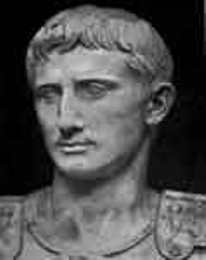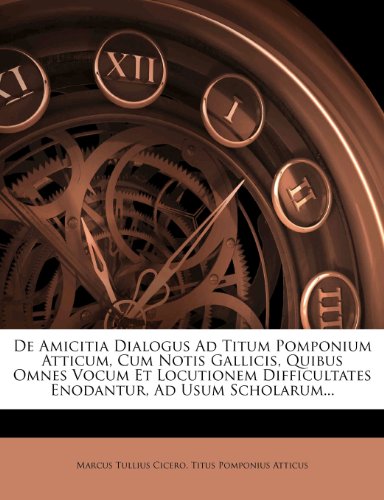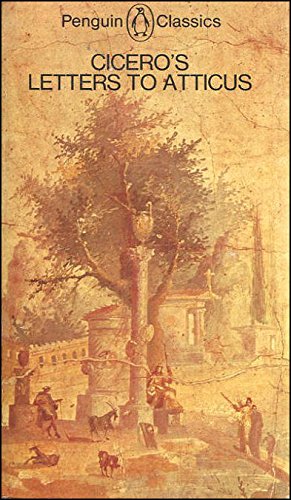Background
Atticus was born in 110 BC in Rome. He was born into a family of the equestrian order, wealthy Romans who did not run for political office. He was the boyhood friend of Marcus Cicero, and his sister married Cicero’s brother.



(This is a reproduction of a book published before 1923. T...)
This is a reproduction of a book published before 1923. This book may have occasional imperfections such as missing or blurred pages, poor pictures, errant marks, etc. that were either part of the original artifact, or were introduced by the scanning process. We believe this work is culturally important, and despite the imperfections, have elected to bring it back into print as part of our continuing commitment to the preservation of printed works worldwide. We appreciate your understanding of the imperfections in the preservation process, and hope you enjoy this valuable book. ++++ The below data was compiled from various identification fields in the bibliographic record of this title. This data is provided as an additional tool in helping to ensure edition identification: ++++ De Amicitia Dialogus Ad Titum Pomponium Atticum, Cum Notis Gallicis, Quibus Omnes Vocum Et Locutionem Difficultates Enodantur, Ad Usum Scholarum Marcus Tullius Cicero, Titus Pomponius Atticus Aug. Delalain, 1820
http://www.amazon.com/gp/product/1275160964/?tag=2022091-20

(This is a one-volume reprinted edition with corrections a...)
This is a one-volume reprinted edition with corrections and a new foreword of D. R. Shackleton Bailey's acclaimed translation of Cicero's letters, previously appearing in two volumes. It includes an introduction, appendices on Roman history, glossaries, maps, and a concordance.
http://www.amazon.com/gp/product/0140443096/?tag=2022091-20
banker editor patron of letters
Atticus was born in 110 BC in Rome. He was born into a family of the equestrian order, wealthy Romans who did not run for political office. He was the boyhood friend of Marcus Cicero, and his sister married Cicero’s brother.
In 85 BC Atticus moved to Athens to further his education, particularly in philosophy.
He inherited the fortune of an uncle, Quintus Caecilius.
In 85 he sold his holdings in Italy and moved to Athens because he feared that violence would erupt when Sulla and his army returned from fighting the Parthian king Mithradates II. Atticus (meaning “inhabitant of Attica”) remained in Athens until the mid-60s. While there, he cultivated his own artistic, literary, philosophical, and antiquarian interests; for the rest of his life, he spent time in Epirus in northern Greece, as well as in Italy and Athens.
Modern knowledge of his life comes from his immense correspondence with Cicero—the Letters to Atticus (Epistulae ad Atticum)—and from a brief biography in De viris illustribus (Lives of Illustrious Men), by his Roman friend the writer Cornelius Nepos. Both sources portray Atticus as a man endowed with gifts of moderation and diplomacy; he managed to maintain relationships with the major political figures of the time, from Gaius Marius to Octavian (the future Augustus), without ever actually participating in the rough-and-tumble of Roman politics. His professed adherence to Epicureanism, a philosophy that encouraged its disciples to maintain a distance from active politics, may have played a role in his stance. Cicero, however, felt that his friend was not an orthodox Epicurean; in De finibus (“On Goals”), Cicero interrupts an anti-Epicurean polemic to praise Atticus as a connoisseur of Roman memorabilia.
Atticus himself wrote Liber annalis (“Yearly Accounts”), published in 47 bc, which presented a list of important dates in world history, concentrating on events and magistrates from the origins of Rome to his own time. Atticus had other historical interests, writing works on the Roman calendar and on important Roman families (including his own, which was supposed to have included the second Roman king, Numa Pompilius). All of Atticus’s works, however, have been lost. Atticus also advised Cicero on his writing and used his own educated slaves to copy and distribute several of Cicero’s philosophical and oratorical works.
Although the triumvirs, which included Octavian, had condemned Cicero to death in 43 bc, Atticus became good friends with Octavian’s friend and adviser Marcus Vipsanius Agrippa and gave his daughter to him in marriage. In 32 bc Atticus became incurably ill and committed suicide.
Titus Pomponius Atticus is best known for his correspondence and close friendship with prominent Roman statesman Marcus Tullius Cicero. His most important work was his edition of the letters addressed to him by Cicero. He also formed a large library at Athens, and engaged a staff of slaves to make copies of valuable works.
(This is a one-volume reprinted edition with corrections a...)
(This is a reproduction of a book published before 1923. T...)
In his later years, he married a relative, Caecilia Pilea/Pilia (c. 75 – 46 BC), daughter of Pileus/ Pilius and a maternal granddaughter of the Triumvir, Crassus. Atticus and Pilea/Pilia were married in 58/56 BC, when Atticus was already 53/54 years old, and she died after 12 years of happy marriage. She bore him a son of the same name, Titus Pomponius Atticus (of whom little is known), as well as a daughter, Caecilia Pomponia Attica, who became the first wife of Marcus Vipsanius Agrippa.
